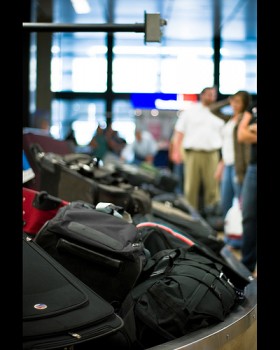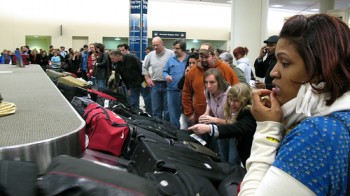 I have a pet peeve when I travel: It really bugs me how people insist on crowding around the baggage claim to wait for their bags. If everyone would simply stand back about 5 or 6 feet from the carousel, it would be so much easier for everyone to see the bags going by, and to easily retrieve their bag without having to navigate around their fellow passengers.
I have a pet peeve when I travel: It really bugs me how people insist on crowding around the baggage claim to wait for their bags. If everyone would simply stand back about 5 or 6 feet from the carousel, it would be so much easier for everyone to see the bags going by, and to easily retrieve their bag without having to navigate around their fellow passengers.
I recently took a course on “Irrational Behavior,” taught by renown behavioral economist, Dan Ariely, who uses the concept of “inflation” to describe how this kind of behavior can evolve. An example Ariely uses (as related to him by his economist grandfather) is what happens in a small concert arena: When the people in the first row of a concert stand up, then the second row is forced to stand up, and then the third and so on. Soon, everyone is standing. Everyone has relatively the same view, but now everyone is a lot less comfortable. As Ariely says, “When everybody just worries about their own relative position, there’s a chance for destroying the whole eco-system.” (from his video lecture 1.4, 12:00).
The baggage carousel elicits a similar kind of “inflation” in that the first people to arrive feel free to scoot right up to the edge, which forces the later passengers to also crowd in beside them until everyone is packed around the edge making it difficult for everyone to find and retrieve their bags.
I have observed this phenomenon in hundreds of airports around the world, leading me to believe that this is a pervasive challenge that extends across borders and cultures.
The problem is that people are not thinking in a collectivist/collaborative mindset as they arrive to the carousel. They are thinking competitively, with each one wanting to be the first to get his or her bag. In The Darwin Economy, by economist Bob Frank (as cited in Ariely’s video lecture 1.4, 10:30), he describes how lion seals, while competing to be larger than their competition, all become morbidly overweight. Ariely explains it as “a race to the top that is perfectly sensible for each lion seal . . . but nevertheless it’s destructive for the whole environment.” (11:10).
 Ariely would likely describe this behavior as “herding,” like how people tend to go to restaurants where other patrons are present, or research participants will ignore a potentially dangerous fire if they see that their cohorts are not reacting. Airline passengers simply “follow the crowd” to the carousel without fully considering the options of how best to approach it.
Ariely would likely describe this behavior as “herding,” like how people tend to go to restaurants where other patrons are present, or research participants will ignore a potentially dangerous fire if they see that their cohorts are not reacting. Airline passengers simply “follow the crowd” to the carousel without fully considering the options of how best to approach it.
In Ariely’s course, he gives several strategies for dealing with irrational behavior. Here are a few options that could be applied to the problem of the carousel:
- Change the default. As people approach the carousel, there is nowhere that indicates where they should stop, so the default resting place becomes the edge of the carousel. If airports could mark a line, and perhaps even create a bumpy texture on the floor in a 5’ radius around the carousel, it would give people a new default for where to stop.
- Offer a choice set that shifts their perspective. Airlines could give a survey to their passengers before deplaning asking them what they feel is the appropriate distance to stand from the baggage carousel, 3 feet, 5 feet or 10 feet. By not even giving 0 feet as an option it would send the message that standing right at the front of the carousel is not even viable. It implies that most people choose to stand between 3 and 10 feet away. Since people tend to follow others, this implication would affect their behavior.
- Make it a moral decision. Even with a line on the floor, people may be likely to cheat, especially if they see others ignoring the boundary. But according to Ariely, people regularly have to balance between doing what will yield the greatest self-benefit and doing what will make them feel that they are “good, honest, wonderful, moral people” (lecture 3.2, :05). Because standing at the carousel is such a visible, public act, it would be easy to display some clear signage that might tarnish a person’s moral self-image should they choose to stand too close. (Perhaps the sign could read, “Be courteous to your fellow passengers by standing behind the red line until your bag appears.”)
Unfortunately, no airport has asked me (or Ariely for that matter) to solve their baggage carousel problem, so I will likely have to suffer my pet peeve a bit more (while modeling appropriate behavior 5 feet behind the crowds at the carousel.)
When you consider an example like this, you realize that irrational behavior is all around us, and sometimes it is engendered or fostered by the simple systems that have evolved in our society. Simple solutions are readily available if only we dig in to the work of behavioral economics.
—
References and recommended reading:
Ariely, D. (2010). Predictably Irrational, Revised and Expanded Edition: The Hidden Forces That Shape Our Decisions. Harper Perennial.
by Jeremy McCarthy
Connect with me on facebook, twitter, or pinterest.

Option 4 – change the environment. Don’t have luggage carousels and offer a different service, e.g. hand-deliver each luggage lovingly and carefully to the traveller, while smiling and thanking them for choosing your airline and welcoming them to their final destination. Think it would ever catch on? 🙂
Hi, Jeremy,
What a grand idea! At 5′ 1″ tall, and 100 lbs, when I travel alone, I have kindly asked if I could squeeze when I saw my suitcase coming down the line. Sometimes kind men have asked me which one is mine and dragged it off for me.
Before I had a chronic frozen shoulder I could easily drag it off, but no longer. I don’t like asking for help, but at this stage of the game, if I don’t travel with only a carry on, I need to open my mouth to get a large suitcase. A rather loud “Excuse me!” is often imperative.
How wonderful a 3-5′ line would be. I would love to see an experiment to see if folks would be more generous and kind. I used to help others with their luggage is I saw them struggling, and they were appreciative. But the hordes of travelers trying to make their next flight or get home faster have taken over.
I have been privvy to the kindest people as well as those who have shoved me out of the way. I think less employees at the airports due to staff cuts makes it worse, too.
I am so happy you blogged about this. Wouldn’t it be fun to do hidden cameras here, get their VIA’s and see where the helpers stand? Or to get their excuse for not being mindfully kind.
Thanks much, Jeremy. Very original and timely.
A big peeve of my is actually boarding and getting off the plane. All the same challenges abound. By the time I grab my bag at the carousel, I’m resigned to plowing people over- with compassion of course.
I’m convinced that an airport is an excellent testing ground for ones humanity. It reflects our inner reality (happiness).
Great topic. Would have made an excellent Seinfeld episode.
E
I don’t know if he ever tried it at a baggage carousel, but a former boss of mine was quite effective in many other situations by standing right where he wanted to end up at the front of the crowd, extending his arms, and announcing in a big, former Bed-Stuy junior high principal’s voice something like, “All right. I need each of you to step back five feet from the carousel now, so that everyone can spot their bags. Everyone step back now.”
Often, he would end up first in line by getting everyone else into one. And most folks thanked him for bringing order to their chaos.
Wow, Patty, he sounds like an amazing man!
I got off the plane in Milwaukee today and was ready to do an experiment to kindly speak up. Unreal what happened. Everyone was nice, and no one was pushing. Everyone was in their place.
I wanted to make a difference. That’s when I noticed an elderly couple who were stretching and didn’t seem strong. I offered to remove all their bags, and none were too heavy. it was easy and fun. They sweetly thanked me and I smiled waiting for mine to come along.
As I left, the old man, I am sure in his 80’s, yelled, “There goes our special angel who made our day!” I waved. I was the humble happy one.
And here I was ready for bear…
I thought I was the only one who had this pet peeve! Yes, I think we will have to suffer a little bit more until the airlines ask our opinion:)